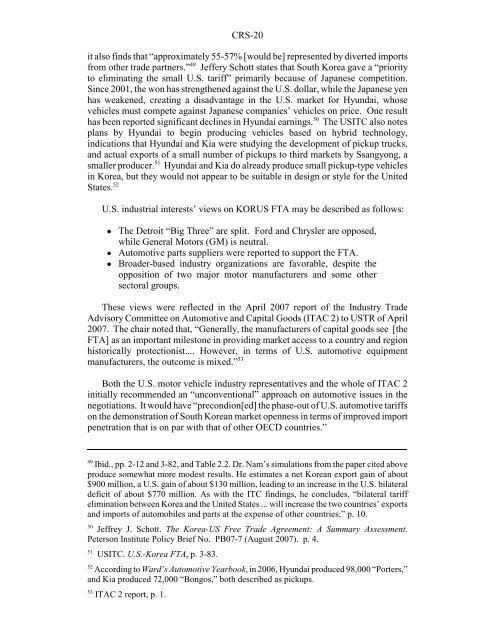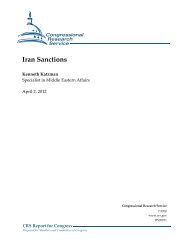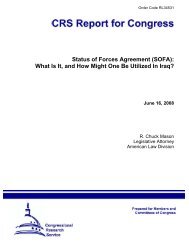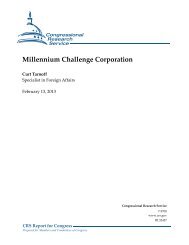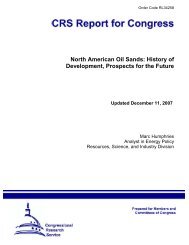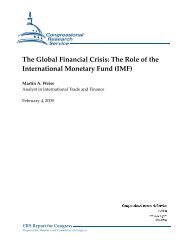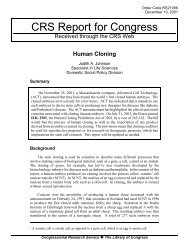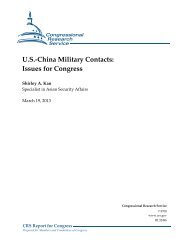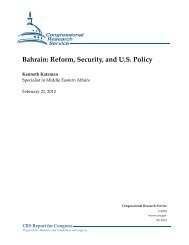The Proposed U.S.-South Korea Free Trade Agreement (KORUS ...
The Proposed U.S.-South Korea Free Trade Agreement (KORUS ...
The Proposed U.S.-South Korea Free Trade Agreement (KORUS ...
- TAGS
- korea
- fpc.state.gov
You also want an ePaper? Increase the reach of your titles
YUMPU automatically turns print PDFs into web optimized ePapers that Google loves.
CRS-20<br />
it also finds that “approximately 55-57% [would be] represented by diverted imports<br />
from other trade partners.” 49 Jeffery Schott states that <strong>South</strong> <strong>Korea</strong> gave a “priority<br />
to eliminating the small U.S. tariff” primarily because of Japanese competition.<br />
Since 2001, the won has strengthened against the U.S. dollar, while the Japanese yen<br />
has weakened, creating a disadvantage in the U.S. market for Hyundai, whose<br />
vehicles must compete against Japanese companies’ vehicles on price. One result<br />
has been reported significant declines in Hyundai earnings. 50 <strong>The</strong> USITC also notes<br />
plans by Hyundai to begin producing vehicles based on hybrid technology,<br />
indications that Hyundai and Kia were studying the development of pickup trucks,<br />
and actual exports of a small number of pickups to third markets by Ssangyong, a<br />
smaller producer. 51 Hyundai and Kia do already produce small pickup-type vehicles<br />
in <strong>Korea</strong>, but they would not appear to be suitable in design or style for the United<br />
States. 52<br />
U.S. industrial interests’ views on <strong>KORUS</strong> FTA may be described as follows:<br />
! <strong>The</strong> Detroit “Big Three” are split. Ford and Chrysler are opposed,<br />
while General Motors (GM) is neutral.<br />
! Automotive parts suppliers were reported to support the FTA.<br />
! Broader-based industry organizations are favorable, despite the<br />
opposition of two major motor manufacturers and some other<br />
sectoral groups.<br />
<strong>The</strong>se views were reflected in the April 2007 report of the Industry <strong>Trade</strong><br />
Advisory Committee on Automotive and Capital Goods (ITAC 2) to USTR of April<br />
2007. <strong>The</strong> chair noted that, “Generally, the manufacturers of capital goods see [the<br />
FTA] as an important milestone in providing market access to a country and region<br />
historically protectionist.... However, in terms of U.S. automotive equipment<br />
manufacturers, the outcome is mixed.” 53<br />
Both the U.S. motor vehicle industry representatives and the whole of ITAC 2<br />
initially recommended an “unconventional” approach on automotive issues in the<br />
negotiations. It would have “precondion[ed] the phase-out of U.S. automotive tariffs<br />
on the demonstration of <strong>South</strong> <strong>Korea</strong>n market openness in terms of improved import<br />
penetration that is on par with that of other OECD countries.”<br />
49 Ibid., pp. 2-12 and 3-82, and Table 2.2. Dr. Nam’s simulations from the paper cited above<br />
produce somewhat more modest results. He estimates a net <strong>Korea</strong>n export gain of about<br />
$900 million, a U.S. gain of about $130 million, leading to an increase in the U.S. bilateral<br />
deficit of about $770 million. As with the ITC findings, he concludes, “bilateral tariff<br />
elimination between <strong>Korea</strong> and the United States ... will increase the two countries’ exports<br />
and imports of automobiles and parts at the expense of other countries;” p. 10.<br />
50 Jeffrey J. Schott. <strong>The</strong> <strong>Korea</strong>-US <strong>Free</strong> <strong>Trade</strong> <strong>Agreement</strong>: A Summary Assessment.<br />
Peterson Institute Policy Brief No. PB07-7 (August 2007). p. 4.<br />
51 USITC. U.S.-<strong>Korea</strong> FTA, p. 3-83.<br />
52 According to Ward’s Automotive Yearbook, in 2006, Hyundai produced 98,000 “Porters,”<br />
and Kia produced 72,000 “Bongos,” both described as pickups.<br />
53 ITAC 2 report, p. 1.


